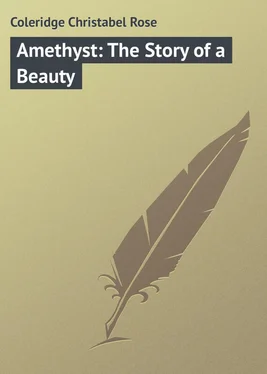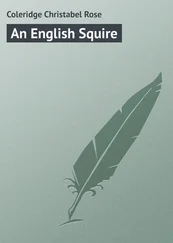Christabel Coleridge - Amethyst - The Story of a Beauty
Здесь есть возможность читать онлайн «Christabel Coleridge - Amethyst - The Story of a Beauty» — ознакомительный отрывок электронной книги совершенно бесплатно, а после прочтения отрывка купить полную версию. В некоторых случаях можно слушать аудио, скачать через торрент в формате fb2 и присутствует краткое содержание. Жанр: foreign_prose, на английском языке. Описание произведения, (предисловие) а так же отзывы посетителей доступны на портале библиотеки ЛибКат.
- Название:Amethyst: The Story of a Beauty
- Автор:
- Жанр:
- Год:неизвестен
- ISBN:нет данных
- Рейтинг книги:5 / 5. Голосов: 1
-
Избранное:Добавить в избранное
- Отзывы:
-
Ваша оценка:
- 100
- 1
- 2
- 3
- 4
- 5
Amethyst: The Story of a Beauty: краткое содержание, описание и аннотация
Предлагаем к чтению аннотацию, описание, краткое содержание или предисловие (зависит от того, что написал сам автор книги «Amethyst: The Story of a Beauty»). Если вы не нашли необходимую информацию о книге — напишите в комментариях, мы постараемся отыскать её.
Amethyst: The Story of a Beauty — читать онлайн ознакомительный отрывок
Ниже представлен текст книги, разбитый по страницам. Система сохранения места последней прочитанной страницы, позволяет с удобством читать онлайн бесплатно книгу «Amethyst: The Story of a Beauty», без необходимости каждый раз заново искать на чём Вы остановились. Поставьте закладку, и сможете в любой момент перейти на страницу, на которой закончили чтение.
Интервал:
Закладка:
Sylvester inherited from his father long angular limbs, rugged but well-formed features, and brown skin. But the dreamy look, latent in the father’s fine grey eyes, was habitual in the son’s; while a certain humorous twinkle in their corners had had less time to develop itself, and was much less apparent in the younger man’s face.
The old Rector had shaggy grey hair, eyebrows, and whiskers; he had grown stout, and his everyday clothes were somewhat loose and shabby. Sylvester had brown hair, cut short, and was close shaved, and his dress was neat, and did his tailor credit. Still, the father’s youth was closely recalled by this son of his old age, and the two found each other congenial spirits.
The fox-terrier that barked in front of them, and the old collie that paced soberly behind, turned eyes of kindness alike on both, the great grey cat rubbed against both pairs of trousers, and the old gardener lay in wait to show Sylvester his side of a dispute with “master” as to the clipping of the lilac hedges.
Fifty years or so ago the Rector of Cleverley had been a young undergraduate, remarkable for the fine scholarship and elegant verse-making of his day, but with a touch of genius that made him differ from his fellows; careless, simple, and untidy, yet fond of society and good fellowship, full of the romance and sentiment of his day, – a man who admired pretty women, but had only one lasting love, from whom circumstances had divided him till he married her late in life, and lost her soon after Sylvester’s birth.
When, on his marriage, he took the living of Cleverley, he became an excellent parish priest, the personal friend of all his flock, and deeply beloved by them; a little shy of modern organisation, and more hard on his curates for mispronouncing Greek names than on many worse offenders. He was a gentleman, and a man of the world who had other experiences than those of parochial life, and belonged to a race of clergy more common in the last generation than in this one.
Sylvester was meant to be much the same sort of person as his father; but he was born in a grave and more self-conscious age. He had all the Rector’s cordial kindliness, and much of his keen insight; but the romantic, dreamy side of the character was both more carefully hidden and stronger in the younger man. The sentiment of the eighth decade of the nineteenth century was less cheerful and light-hearted than that of the third or fourth. The Rector had been among those who still laughed and sighed with Moore, and smiled with Praed (he had not been the sort of man to give himself over to Byron). He had fallen in love with the miller’s and the gardener’s fair daughters in the early days of Tennyson. Sylvester dived into Browning, and dreamed with Rossetti. He was haunted by ideals which he did not hope to realise; and, moreover, felt himself compelled frequently to pretend that he had no ideals at all.
And although he had worked hard to attain his university distinctions, he took the duties they involved somewhat lightly, and hardly found in his profession a sufficient interest and aim in life, fulfilling its claims in fact in a somewhat formal fashion.
He was, however, a very affectionate son, and was delighted to find himself at home again, and full of curiosity as to the new-comers at Cleverley Hall.
“Are they as charming as they appeared at first sight?” he asked.
“My dear boy,” said the Rector in a confidential tone, “they are very charming. But I’m sorry for the little girl. There’s something ideal about her. But it’s a bad stock, Syl, a bad stock!”
“So I’ve always heard,” said Sylvester, slightly amused at his father’s tone of reluctant admiration. “But what’s amiss with them? We’re to dine there to-night, I believe?”
“Yes,” said the Rector, “and we shall have a very pleasant evening. You see, my dear boy, the ladies here are rather pleased with Lady Haredale. They were prejudiced – very much prejudiced against her. Now they say she is much nicer and quieter than they expected, and they believe that the reports about her are exaggerated. But they don’t see that she is so handsome. The fact is, you know, Syl,” and here Mr Riddell paused in his walk and spoke in confidential accents, “that she belongs to another order of women altogether – to the fascinating women of history, and her beauty is a fact quite beyond discussion. But she’s not a good woman, Sylvester, and never will be.”
“The fascinating women of history,” said Sylvester – “Cleopatra, and others, were perhaps a little deficient in moral backbone. But I’m sure, father, Lady Haredale must be a charming hostess. I quite look forward to the party to-night. So she outshines her daughter, I suppose.”
“My dear boy,” said Mr Riddell, “there’s something about that little girl that goes to one’s heart. What is to become of her?”
“But what is it that is so dangerous about Lady Haredale?” said Sylvester. “She doesn’t appear to offend the proprieties.”
“She has no principle, Syl – not a stiver,” said the Rector, “and I like the look of none of their friends. So, my dear boy, I wouldn’t advise you to get drawn into the set too much. They’re very sociable and hospitable. Young Leigh seems a good deal attracted.”
“Old Lucy? Really? Has he succumbed to the historical type of fascination? The young lady must be charming indeed. But, father, I am immensely interested. I must study these historical ladies – at a distance, of course. But there’s Aunt Meg. I must go and ask her how the parish is getting on.”
Miss Riddell, who represented the practical element in the household and family, honestly said that she liked gossip. Sylvester called it studying life. In both, it was really kindly interest in old friends and neighbours.
But to-day, she was so much taken up with the new-comers, and evidently admired them so much, that Sylvester prepared for the dinner-party with much curiosity. As he followed his father and aunt into the long low drawing-room, he was struck at once by its more tasteful and cheerful appearance than when he had last seen it, and by the lively murmur of conversation that filled it, and, as he advanced to receive Lady Haredale’s greeting, he did not think that she was splendidly dressed, or startlingly fashionable, but he perceived at once that she was a great beauty. She introduced “my eldest daughter,” and Sylvester saw, standing by her side, a tall girl, in the simplest of white gowns, but with splendid jewels clasping her slender throat, and shining in her hair. She smiled, and looked at him with the most cordial friendliness, and she struck him as quite unlike the general run of young ladies, with her lithe graceful figure, her full soft lips, and her clear spiritual eyes.
“I know what it is,” thought Sylvester, “she is Rossetti’s ideal; but he never reached her. She is the maiden that Chiaro saw. But she is also a happy girl. By Jove! no wonder the dad was so impressive!”
Presently Mrs Leigh and her son arrived to complete the party, and were greeted by Amethyst as well-established acquaintances.
Sylvester knew Lucian Leigh well, had been at school with him, and believed him to be, in all points, a good fellow. But as he watched him making small talk with greater ease than usual to the young lady, it struck Sylvester as a new idea that it was a pity that Lucian’s appearance was so deceptive; he had not at all the sort of character suggested by the first sight of his face. But that the two faces harmonised well as they sat side by side at the table, was indisputable.
Presently, he saw Amethyst turn to the Rector, who sat on her left hand, and begin to talk to him with pretty respectful courtesy. Evidently she did not think it well-behaved to be absorbed in her younger companion, and Mr Riddell succeeded in amusing her, for she laughed and looked interested, and he evidently put forward his best powers of pleasing.
Читать дальшеИнтервал:
Закладка:
Похожие книги на «Amethyst: The Story of a Beauty»
Представляем Вашему вниманию похожие книги на «Amethyst: The Story of a Beauty» списком для выбора. Мы отобрали схожую по названию и смыслу литературу в надежде предоставить читателям больше вариантов отыскать новые, интересные, ещё непрочитанные произведения.
Обсуждение, отзывы о книге «Amethyst: The Story of a Beauty» и просто собственные мнения читателей. Оставьте ваши комментарии, напишите, что Вы думаете о произведении, его смысле или главных героях. Укажите что конкретно понравилось, а что нет, и почему Вы так считаете.












